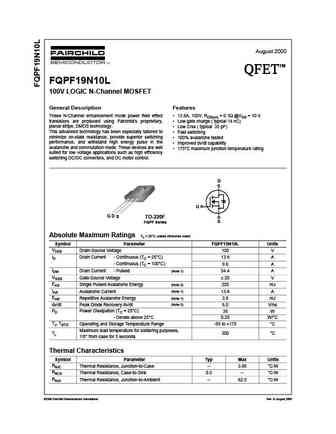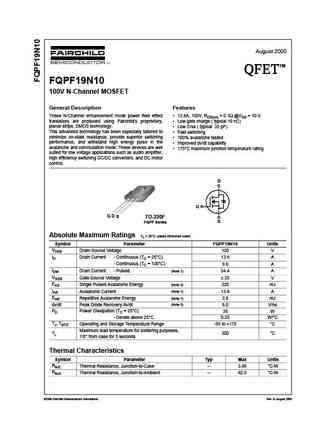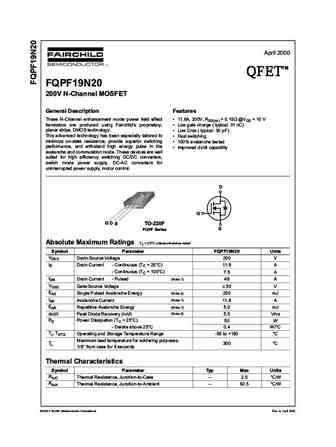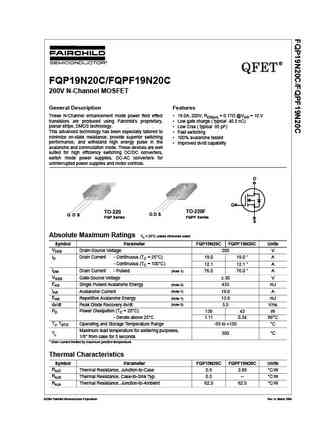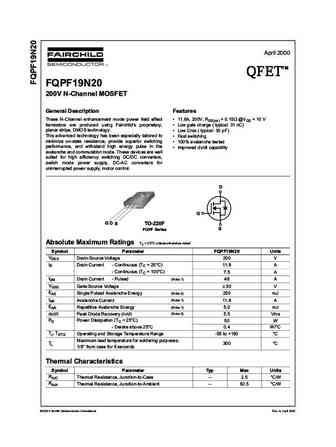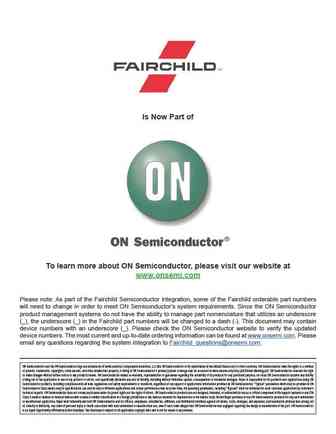FQPF19N10L MOSFET Equivalente. Reemplazo. Hoja de especificaciones. Principales características
Número de Parte: FQPF19N10L
Tipo de FET: MOSFET
Polaridad de transistor: N
ESPECIFICACIONES MÁXIMAS
Pdⓘ - Máxima disipación de potencia: 38 W
|Vds|ⓘ - Voltaje máximo drenador-fuente: 100 V
|Vgs|ⓘ - Voltaje máximo fuente-puerta: 20 V
|Id|ⓘ - Corriente continua de drenaje: 13.6 A
Tjⓘ - Temperatura máxima de unión: 175 °C
CARACTERÍSTICAS ELÉCTRICAS
trⓘ - Tiempo de subida: 410 nS
Cossⓘ - Capacitancia de salida: 160 pF
RDSonⓘ - Resistencia estado encendido drenaje a fuente: 0.1 Ohm
Encapsulados: TO-220F
Búsqueda de reemplazo de FQPF19N10L MOSFET
- Selecciónⓘ de transistores por parámetros
FQPF19N10L datasheet
fqpf19n10l.pdf
August 2000 TM QFET QFET QFET QFET FQPF19N10L 100V LOGIC N-Channel MOSFET General Description Features These N-Channel enhancement mode power field effect 13.6A, 100V, RDS(on) = 0.1 @VGS = 10 V transistors are produced using Fairchild s proprietary, Low gate charge ( typical 14 nC) planar stripe, DMOS technology. Low Crss ( typical 35 pF) This advanced technology h
fqpf19n10.pdf
August 2000 TM QFET QFET QFET QFET FQPF19N10 100V N-Channel MOSFET General Description Features These N-Channel enhancement mode power field effect 13.6A, 100V, RDS(on) = 0.1 @VGS = 10 V transistors are produced using Fairchild s proprietary, Low gate charge ( typical 19 nC) planar stripe, DMOS technology. Low Crss ( typical 32 pF) This advanced technology has been
fqpf19n20t.pdf
April 2000 TM QFET QFET QFET QFET 200V N-ChanneI MOSFET GeneraI Description Features These N-Channel enhancement mode power field effect 11.8A, 200V, RDS(on) = 0.15 @VGS = 10 V transistors are produced using Fairchild s proprietary, Low gate charge ( typical 31 nC) planar stripe, DMOS technology. Low Crss ( typical 30 pF) This advanced technology has be
fqp19n20ctstu fqp19n20c fqpf19n20c fqpf19n20cydtu.pdf
QFET FQP19N20C/FQPF19N20C 200V N-Channel MOSFET General Description Features These N-Channel enhancement mode power field effect 19.0A, 200V, RDS(on) = 0.17 @VGS = 10 V transistors are produced using Fairchild s proprietary, Low gate charge ( typical 40.5 nC) planar stripe, DMOS technology. Low Crss ( typical 85 pF) This advanced technology has been especially tailo
Otros transistores... FQPF16N25, FQPF17N08, FQPF17N08L, FQPF17N40T, FQPF17P06, FQPF17P10, FQPF18N20V2, FQPF18N50V2, 5N60, FQPF19N20CYDTU, FQPF19N20T, FQPF1N50, FQPF1N60, FQPF1N60T, FQPF1P50, FQPF27N25T, FQPF28N15
🌐 : EN ES РУ
Liste
Recientemente añadidas las descripciónes de los transistores:
MOSFET: AKF30N5P0SX | AKF30N10S | AKF20P45D | CM4407 | CM3407 | CM3400 | SVF11N65F | SVF11N65T | FKBB3105 | EHBA036R1 | CRTT067N10N | AP6NA3R2MT | AP65SA145DDT8 | AP4NAR95CMT-A | AP4024GEMT-HF | AP3P050AH
Popular searches
2n3440 | bc550c | 2n3904 transistor datasheet | p75nf75 | d880 transistor | 2sc1845 | p60nf06 | 2sa1837
